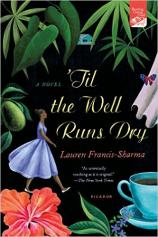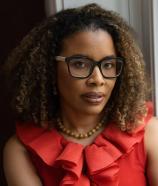Reading Group Guide
Discussion Questions
'Til the Well Runs Dry

1. Each chapter in ‘TIL THE WELL RUNS DRY is told from the perspective one of three characters. Why do you think the author chose these three characters to tell the story, rather than picking one protagonist? How do you think this choice enhanced the storytelling?
2. Why do you think Marcia chose to keep the story of the twin brothers a secret from Farouk, knowing that some version of the story could get back to Farouk sooner or later? And why, once he confronted her with gossip about the situation, was she willing to let the secret damage their relationship rather than tell him the real story?
3. Tanty Gertrude was known to dabble in obeah or the “darker arts,” a practice that offered hope and fear to its devotees. As dangerous as it was to go to Tanty Gertrude, Farouk took his chances. Why do you think he was willing to seek help from her, even though the end result might be something he did not want in his life?
4. “You’re as togedda as you need to be” was Tanty Gertrude’s response after Marcia told the obeah lady her magic had failed because Farouk and Marcia weren’t together. Tanty Gertrude told Marcia their relationship didn’t work out because Marcia had too much pride, but Marcia felt Tanty Gertrude had sabotaged their relationship. Who do you think was right? And why?
5. Why do you think, out of all of her children, Marcia was the hardest on Jacqueline?
6. Freedom vs. commitment are large themes in this book. How does a desire for freedom inform each character’s story? What role does commitment play in limiting their desire for freedom?
7. There has been a lot of discussion in literary circles about the likeability of characters, particularly female characters. Do you feel that you have to “like” or “identify” with a character to enjoy a novel? Do you like or identify with Marcia?
8. Farouk did not tell his family about Marcia and Patsy and went as far as taking Marcia to his parents’ home but misleading them to believe that Marcia was his seamstress. When Jacqueline ran into Farouk and her grandmother years later, he turned Jacqueline away as well. How do you think Marcia’s and the children’s lives might have been different if Farouk had not had such a hard time embracing his role as a husband and father?
9. In telling the story of Marcia Garcia and her children, the author paints a memorable picture of Trinidad’s natural beauty, particularly of the northern coast village of Blanchisseuse. Farouk wanted badly to take Marcia away from Blanchisseuse, yet close to the end of the novel he packed up all his children and took a day trip there. Why was it so important for him to go back?
10. What do you think about the way Farouk’s character was revealed over the course of the novel?
11. What do you think was the reason behind Patsy’s rebellion?
12. When Jacqueline left home, the Garcia house went to shambles. Earlier in the story, Marcia had taken pride in keeping a clean house; what does the messy home symbolize?
13. Inspector Chung Marlock told Marcia that she was the kind of woman “who’s always looking to find a way out” and will soon realize that there’s no place left to run. Do you think this was true? What impact do these words have on Marcia?
14. For Marcia, New York symbolized risk. How did going to New York change her? Were you shocked when she went to visit Mrs. Silverman’s a second time? Why or why not?
15. Were you surprised when you found out about the brothers? How do you think Marcia’s life would have been different if they weren’t taken away from her?
16. This novel sheds light on many of the challenges immigrants face in America. Why, after all the mistreatment she suffered, does Marcia still feel as if bringing her children to America is the right decision? Do you feel more informed about recent immigration history after reading this book?
'Til the Well Runs Dry
- Publication Date: September 15, 2015
- Genres: Family Life, Fiction, Historical Fiction, Literary Fiction
- Paperback: 416 pages
- Publisher: Picador
- ISBN-10: 1250074673
- ISBN-13: 9781250074676








